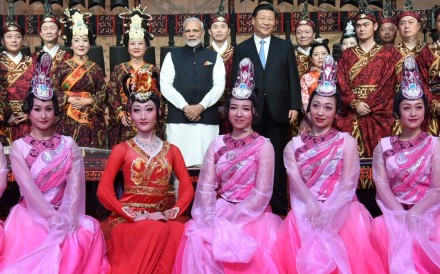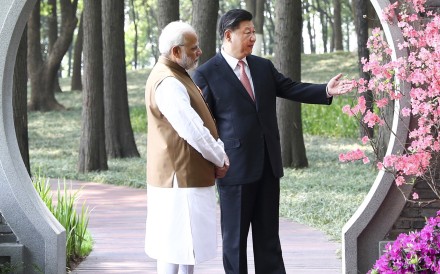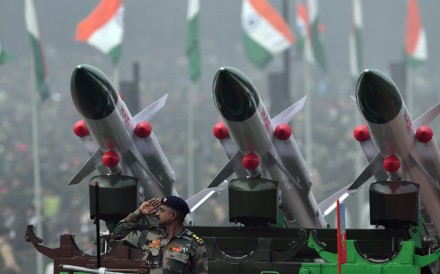How Bollywood is giving Hollywood a run for its money in China
Sabena Siddiqi says Hollywood films seem to have lost their lustre in China, where domestic releases and films from India are fuelling box-office revenue
PUBLISHED : Tuesday, 08 May, 2018, 5:23pm
UPDATED : Tuesday, 08 May, 2018, 7:25pm
Having broken records for monthly box-office sales in a single market, China is rapidly moving towards becoming the world’s biggest box office on the back of new film trends. Overtaking the US in February 2018, the Chinese box office raked in 10.1 billion yuan (US$1.6 billion) at a time when domestic films were dominating screens.
Apparently, Hollywood films are not in high demand any more, as they were not responsible for the booming numbers. Proving this point, in March when there were no domestic releases, the earnings were only half that of the previous month.
Most notable among those that created waves at the box office was Chinese action thriller Wolf Warrior 2, which accounted for 10 per cent of the total box-office earnings last year, becoming China’s top-grossing film of all time. Set in Africa and telling the story of a retired special services soldier fighting Western mercenaries, the film was China’s entry to the “best foreign language” film category at the 2018 Oscars.
Meanwhile, the Chinese audience has apparently had enough of Western films and ideals, displaying a preference for domestic cinema that portrays familiar surroundings and is more imbued with patriotism, family values and a sense of community. This despite Hollywood’s sophisticated and costly marketing campaigns and the Chinese government increasing the quota of foreign films that can be screened in the country from 20 to 34 a year since 2012.
Instead, it was commercial Hindi cinema from India or Bollywood that captivated audiences and contributed to box-office winnings. Dangal , produced by actor-turned-filmmaker Aamir Khan, became a huge hit when it was screened last year, earning US$190 million. It was followed by the success of Indian films such as Secret Superstar , Bajrangi Bhaijan and Hindi Medium.
In fact, the low-budget Secret Superstar fared far better in China than in India and made much more than Hollywood blockbusters in the first three months of 2018. Earning 760 million yuan (US$119.4 million) in China, 10 times more than it made back home, this film topped the list of cinematic imports into the country.
Exploring the rising popularity of Indian film, Tan Zheng, editor of the film magazine Dianying Yishu, said: “The stories in the Indian films are like the stories in China, stories the Chinese relate to.” Films from Spain and Thailand also did well in China in 2017.
Over the last decade, Hollywood films have contributed to the growth of total box-office revenue in China from US$455 million to US$8.6 billion, but their share of revenue in recent years has fallen to 40 per cent from over 50 per cent. Since 2015, only three Hollywood blockbusters have made it to the top 10 most-watched films list in China. A recent example of the changing market is the big-budget Disney film Star Wars: The Last Jedi , which made less than US$50 million in China.
Sure to try to rise to the challenge, Hollywood might come up with story lines and topics that could engage Chinese viewers. China is now the world’s second-largest market for film with a box-office revenue of US$8.6 billion in 2017, compared to US$11 billion in the US.
Confident that the current trends can be reversed, Jonathan Papish, a box-office analyst at China Film Insider , says: “I don’t think Hollywood is going anywhere, modern Chinese moviegoers have grown up on a steady diet of our films since the mid-’90s and that won’t suddenly disappear.”
The potential of film to build bridges between China and India is evident in Chinese foreign ministry spokesperson Hua Chunying’s recent remarks that she had watched Dangal, which she called an “inspirational story”. Capitalising on Aamir Khan’s popularity in China, the Indian government is reportedly considering appointing him brand ambassador to promote trade ties between the countries.
And realising the soft power of Bollywood cinema in China, the Indian ambassador to China Gautam Bambawale suggested that China “import more Bollywood films so as to understand India better”.
Sabena Siddiqi is a foreign affairs journalist with a special focus on the Belt and Road Initiative, the China-Pakistan Economic Corridor and South Asia
This article appeared in the South China Morning Post print edition as: Hollywood films losing their lustre on mainland
SCMP RECOMMENDS (LAST 24HRS)http://www.scmp.com/comment/insight-opinion/article/2145166/how-bollywood-giving-hollywood-run-its-money-china














Comments
Post a Comment